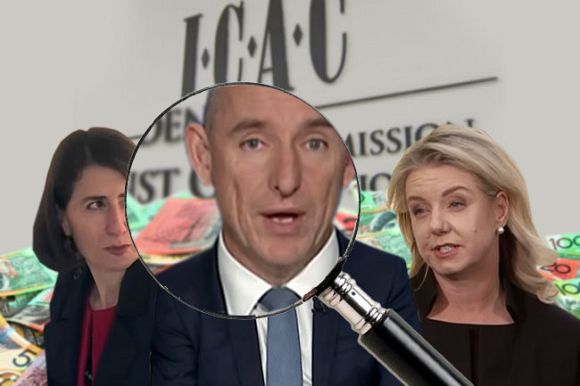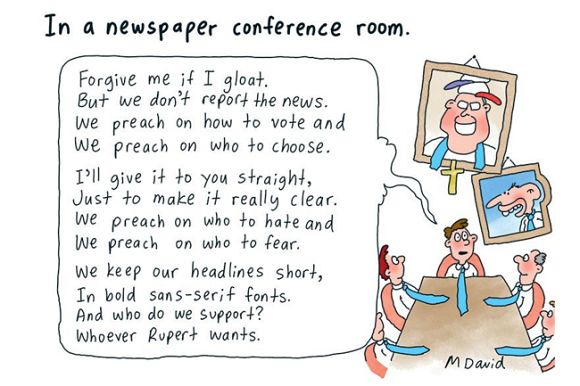With the release of NSW ICAC’s findings on Gladys Berejiklian, an editorial in The Australian has condemned the Commission and made a bold stand for corruption, writes David McIlveen.
LAST WEEK saw the official opening of the National Anti-Corruption Commission (NACC) and the release of the long-awaited findings from the NSW Independent Commission Against Corruption (ICAC) on former Premier Gladys Berejiklian. Quite a week.
It makes for a useful occasion to reflect on corruption in Australian politics and the media, and to point out the people – politicians, publications and hacks – that line up to side with the guilty, attack the accountability body, and provide every lame excuse to downplay or dismiss the findings of corruption. Presumably in hopes of weakening the public unity in condemning something so clearly against its interests.
The few senior current and former Liberals that provided comment on the findings were as predictable as they were vacuous and unprincipled in their responses, and don’t deserve any serious treatment. Their contempt for evidence and ICAC’s hard work and careful deliberation is fitting with the Liberal brand. Just let us use the Treasury as our own private bank account, you can hear them thinking.
The funambulist nature of the Murdoch press is always a little more interesting, however, as it’s forever obliged to try to present itself as “for the people” to its limited readership, while simultaneously promoting the interests of the Liberal Party and its associates.
Let’s look at The Australian’s editorial position on the NSW ICAC findings, for instance (‘ICAC sets itself up as judge and executioner in hearing’). This publication (which, even as the worst corruption of the Morrison Government was repeatedly shocking the public, campaigned against the establishment of a federal ICAC, now the NACC) uses the occasion of the findings of serious corruption by the NSW ICAC not to reiterate the need for greater accountability, transparency and integrity in politics.
Instead, it attempts to smear ICAC as being ‘an unaccountable law unto itself’, with ‘little regard for proper process’, its public hearings as nothing but ‘public shaming’ and the investigation as nothing but a ‘show trial’.
It blathers that ‘voters [should] have the ultimate power to throw out politicians who do not spend wisely’, as if the Premier didn’t resign of her own volition, and as if voters can make informed decisions without the knowledge gained through transparency and exposure, courtesy of the work of accountability bodies like ICAC. The editorial concludes with a demonstration that the author has no understanding as to why the ICAC might make findings of ‘serious corrupt conduct’ without making a referral of her conduct to the Director of Public Prosecutions.
If they’d done a bit of Googling before publishing their illogical hatchet job, or cared to consult someone with a little knowledge on the subject, they’d have understood – as Geoffrey Watson SC of The Centre for Public Integrity explained in the Sydney Morning Herald – that:
‘This simply reflects the difference between the statutory definition of corrupt conduct and specific criminal acts. The statutory definition of corrupt conduct embraces a wide range of conduct that might not be criminal — failure to reveal conflicts of interest is one; pork-barrelling is another. On the ICAC’s findings, Berejiklian’s conduct fell well short of a proper discharge of her public duties, but it was not criminal.’
On the same topic, almost a century ago, famous American journalist and author Walt Lippmann, musing on political corruption in Vanity Fair (‘A Theory About Corruption’) wrote:
The prosecuting agencies, when spasmodically they set to work, can deal only with the crudely overt features of political corruption. Anyone who has observed closely a prosecutor's office on the trail of a political ring knows how enormous is the gap between scandalous political conduct and specifically indictable offences; in my time I have seen case after case of politicians who could not be indicted, or, if indicted, convicted, though they were guilty as Satan, because the development of conclusive legal proof was lacking.
Few of the defences of corrupt conduct should arouse the ire of the public more than “it wasn’t criminal”, as if the bar should be that low. Berejiklian had already tried that ignoble defence to justify the pork barrelling of a $140 million council grants scheme, prior to the 2019 NSW State Election, like the cheater in a game that finds and exploits a loophole in the rules.
Apart from the fact that Berejiklian’s more recent, seriously corrupt conduct and testimony before ICAC breached the state’s ministerial code of conduct and her legal duty under the NSW ICAC Act, it is deeply unethical, contrary to the public interest, and a knowing and deliberate breach of trust with the public for which there should be severe consequences. That the particular instance may not be so grave and blatant as to constitute the breach of any criminal act is no defence of the action, but a reflection of the restricted scope of such acts.
And there is broad scope for “legal corruption” and cronyism in politics simply because politicians are the ones that, quite literally, make the rules. Most politicians are smart enough to know not to make a rod for their own back and to only do corruption at the margins of tolerability/legality.
As to the fatuous smears on the diligent, modest and careful work of ICAC in The Australian’s editorial piece, they don’t deserve a serious rebuttal, and really only serve to reflect poorly on The Australian.
According to Geoffrey Watson, ICAC’s report is:
‘...long and detailed; factual findings are carefully underpinned by references to the factual and documentary evidence. It is a careful report, expressed in moderate terms, justified by the evidence, and supported by the law.’
The same can’t be said for much that appears in the pages of The Australian, unfortunately.
It’s a matter of simple fact that the former Premier’s corrupt conduct would not have come to light were it not for the work of ICAC. The clandestine, ambiguous, tricky nature of corruption (especially the sliding-scale nature of soft corruption, or pork barrelling) demands a dedicated, independent, powerful, transparent and well-resourced integrity commission to counter it.
Calls for “reform” of such bodies, based on supposed, exaggerated shortcomings or ignorant smears, are often thinly veiled threats to “curtail”. It’s always telling to see who’s clamouring for it. Keep an eye on it.
And when it comes to defending the public interest and the good work of ICAC (and, in future, the NACC), it’ll be important to continue to stand firm and be resolute. Because every unscrupulous politician and opportunist hack will exploit any doubt or softness in the public sentiment if they can, hoping to get a free pass for abusing the public trust, and misspending public money.
David McIlveen studied science and environmental engineering at the University of Queensland and now works as an environmental consultant in Brisbane.
Related Articles
- EXCLUSIVE: ICAC gun club a failure prior to grant
- NSW ICAC renews urge for federal commission
- EXCLUSIVE: ICAC gun club figures don't add up
- Flashback 2014: Arthur Sinodinos goes down the gurgler
 This work is licensed under a Creative Commons Attribution-NonCommercial-NoDerivs 3.0 Australia License
This work is licensed under a Creative Commons Attribution-NonCommercial-NoDerivs 3.0 Australia License
Support independent journalism Subscribe to IA.















